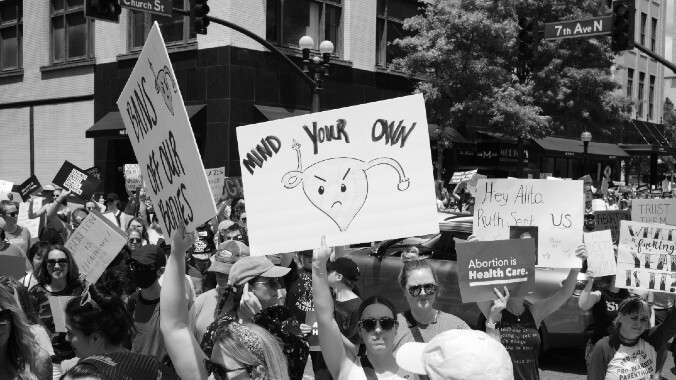1st Arguments in Tennessee Abortion Case Include Plenty of Anti-Abortion Bullshit
At one point, an attorney for the women whose lives were endangered by the abortion ban said he didn't know how the anti-abortion Tennessee attorney general's office could make its arguments "with a straight face."
Photo: Shutterstock Politics
A Tennessee court on Thursday heard the first arguments in a case concerning the state’s abortion ban from both the state and lawyers for the women whose lives and health were endangered by the law. The women, represented by the Center for Reproductive Rights, sued the state in 2023 to clarify what the ban’s narrow and confusing medical exceptions actually include.
Joined by physicians who say they’ve been constrained and threatened by the abortion ban, the lawsuit argues that the exception—which only states that it be used for medical emergencies that pose “serious and substantial risk”—is too vague to actually help anyone. Doctors say they’re turning away women facing severe pregnancy complications, fearing prosecution and imprisonment. Meanwhile, lawyers for Tennessee argue the law is clear, along with the typical bullshit about protecting “unborn life” over pregnant women.
In court on Thursday, CRR attorneys including Linda Goldstein and Marc Hearron argued against the state’s motion to dismiss the suit and also called for an injunction to stop the abortion ban from being enforced until there’s clarity in its medical exception. After the state argued that the ban doesn’t harm patients because it’s meant to criminalize abortion providers, Hearron said he didn’t “really know how [the state] can make that argument with a straight face.”
“A few doctors saying as a matter of fact that they are unclear about what serious risk might entail in an edge case does not show vagueness as a matter of law,” Whitney Hermandorfer, a lawyer with the Tennessee attorney general’s office, said in court on Thursday. She also claimed that the women don’t have standing to sue because they aren’t currently undergoing medical emergencies that relate to the ban. “So while we can all agree the past health circumstances are incredibly unfortunate, I submit here that they do not provide a legal reason to invalidate the medical exception at issue in this case,” Hermandorfer said.
-

-

-

-

-

-

-

-

-

-

-

-

-

-

-

-

-

-

-

-

-

-

-

-

-

-

-

-

-

-

-

-

-

-

-

-

-

-

-

-








































